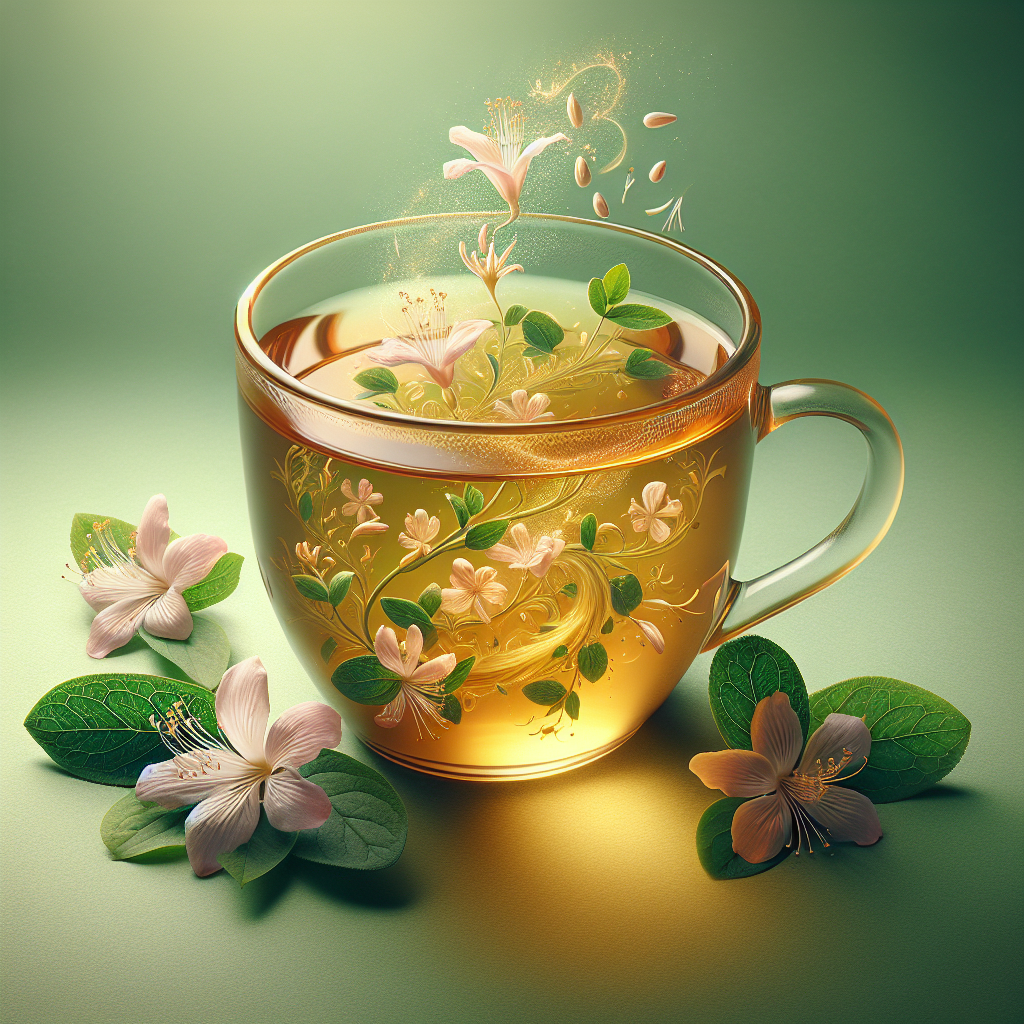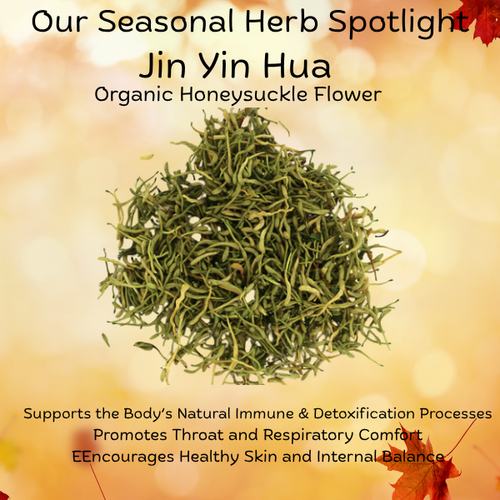Honeysuckle: Nature’s Cooling Blossom with Deep Healing Potential
Posted by Education Team @1st Chinese Herbs on Oct 6th 2025
Honeysuckle (Jin Yin Hua): The Cooling Flower That Balances, Cleanses, and Calms
Few herbs capture the balance of beauty and healing like Honeysuckle Flower (Jin Yin Hua). Its sweet scent signals warmth and love, yet within those delicate petals lies a potent “cooling” force that helps the body restore balance when overheated or inflamed.
Used for centuries in Traditional Chinese Medicine (TCM) to “clear heat and relieve toxicity,” honeysuckle is now recognized by modern science for its antioxidant, anti-inflammatory, and immune-supportive actions.
Quick Facts Grid
| TCM Category | Clear Heat and Resolve Toxicity |
|---|---|
| Meridians Entered | Lung, Stomach, Large Intestine |
| Taste | Sweet |
| Temperature | Cold |
| Key Actions | Clears heat, soothes throat, supports detoxification, cools blood, maintains skin health |
What Is Honeysuckle (Jin Yin Hua)?
Honeysuckle (Lonicera japonica) is a climbing vine whose white flowers turn yellow as they mature — a transformation symbolizing the harmony of Yin and Yang. In Chinese, Jin Yin Hua means “Gold and Silver Flower.”
In TCM, honeysuckle belongs to the Clear Heat and Detoxify category, prized for its ability to calm internal fire and maintain healthy immune function. It’s one of the first herbs practitioners reach for when “heat-toxin” symptoms appear — such as throat irritation, redness, or skin imbalance.
 Why It Works — The Science and TCM Mechanism
Why It Works — The Science and TCM Mechanism
From the TCM Perspective:
Honeysuckle’s sweet, cooling energy clears heat from the body, disperses wind-heat, and resolves toxicity. It’s often paired with Forsythia (Lian Qiao) for enhanced detox and respiratory support.
From the Scientific Perspective:
Research shows honeysuckle is rich in:
-
Flavonoids (luteolin, quercetin) – powerful antioxidants that moderate inflammatory signaling.
-
Iridoids and phenolic acids – compounds that modulate immune balance and microbial activity.
-
Chlorogenic acid – linked to liver protection and metabolic support.
-
MicroRNA 2911 – a unique molecule studied for its cell-regulating effects (PMC7127058).
Together, these constituents help the body adapt to heat, oxidative stress, and environmental challenges — making Honeysuckle both a soothing and protective ally.
Top Health Benefits of Honeysuckle
1. Supports Healthy Immune Function
Honeysuckle helps the body maintain balanced immune defenses by promoting normal inflammatory responses.
-
Supports immune resilience during seasonal transitions
-
Encourages natural detoxification pathways
(PubMed PMID 31551831)
2. Promotes Throat & Respiratory Comfort
As a “cooling flower,” honeysuckle helps maintain clear breathing and a calm throat when internal heat rises.
-
Traditionally used to soothe throat and upper-airway heat
-
Complements herbs like mint and forysthia for respiratory balance
3. Encourages Healthy Skin & Detoxification
Honeysuckle flower supports the body’s natural detox systems that keep skin clear and radiant.
-
Promotes clear complexion and internal cooling
-
Commonly used in herbal washes or teas to maintain skin balance
(PMID 32652526)
Who Should Use It — and Who Should Avoid It
Ideal For:
-
Individuals with “heat patterns” — redness, irritability, or internal warmth
-
Those seeking natural detox or immune balance
-
Anyone needing gentle cooling and soothing for the skin or throat
Use with Caution If:
-
You feel cold easily or have low digestive fire
-
You are pregnant or nursing (consult practitioner)
-
You are taking strong medications — consult your healthcare provider first
When and How to Use Honeysuckle
| Form | How to Prepare | When to Use |
|---|---|---|
| Herbal Tea (Decoction) | Steep 5–10 g dried flowers in hot water for 15 min | During periods of heat or seasonal stress |
| Powder / Extract | Mix 1–2 g in warm water 1–2× daily | For easy daily maintenance |
| Capsules / Teapills | Follow label instructions (500–600 mg eq.) | Convenient for busy lifestyles |
| Topical Wash | Cool tea infusion used externally | For skin comfort and heat redness |
Pro Tip: Combine with Ban Lan Gen for added immune support or Chrysanthemum (Ju Hua) for eye and head comfort.
Folklore & Cultural Significance
In ancient China, Honeysuckle symbolized devotion and purity. Its intertwined vines represented enduring love and resilience.
TCM texts describe it as the “flower that dispels pestilent heat.” During epidemics and summer heatwaves, Honeysuckle teas were shared in villages to “calm the heart and clear the path of heat.”
Today, its dual-colored petals (gold and silver) remind us of balance — the union of warmth and coolness, Yin and Yang, body and spirit.
Modern Research & PubMed Highlights
-
PMID 31551831 – Immune modulation and anti-inflammatory effects
-
PMID 32652526 – Skin and antioxidant support mechanisms
-
PMC7127058 – Honeysuckle microRNA and cell regulation
-
Front Nutr 2025 – Gut health and IBD improvement models
-
PMID 27311382 – Respiratory comfort mechanisms
Shop This Herb — Jin Yin Hua from 1st Chinese Herbs
Premium Honeysuckle Flower Buds ( Jin Yin Hua )
Save when you purchase our 5 kilo bulk bags of Jin Yin Hua — ideal for teas, custom formulas, or clinical use.
? How to Use Bulk Herbs →
? 10 Vital Medicinal Herbs That Work (Free eBook) →
? Frequently Asked Questions
Q: Can I drink honeysuckle tea every day?
A: Yes, short-term use is fine for seasonal heat support. For long-term use, consult a qualified herbal practitioner.
Q: Is honeysuckle safe for children?
A: Mild teas are sometimes used for older children under guidance; always seek professional advice first.
Q: Can I combine honeysuckle with other herbs?
A: Yes — it pairs well with Forsythia, Licorice, or Ban Lan Gen for balanced cooling formulas.
References & Further Reading
-
Zhang et al., Frontiers in Nutrition (2025) – Honeysuckle and immune homeostasis.
-
Li et al., Phytotherapy Research (2022) – Lonicera flavonoids and oxidative protection.


